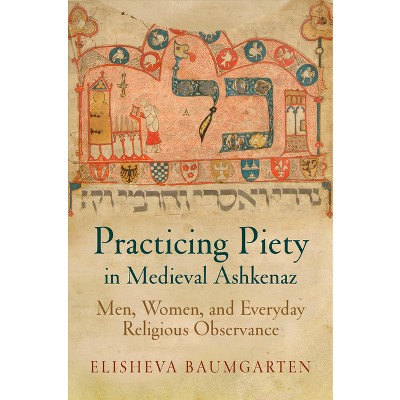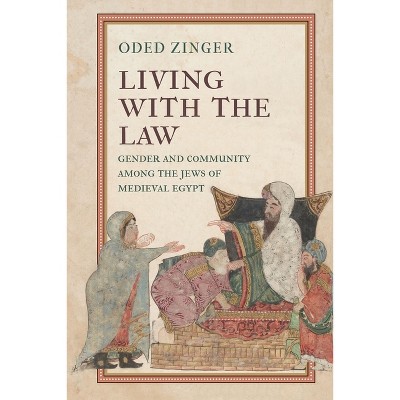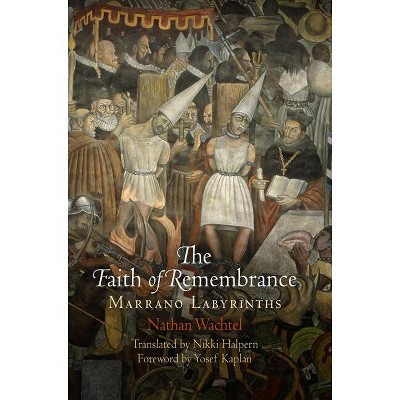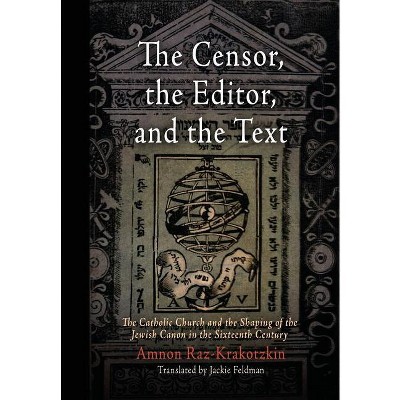Reorienting the East - (Jewish Culture and Contexts) by Martin Jacobs (Hardcover)

About this item
Highlights
- Reorienting the East explores the Islamic world as it was encountered, envisioned, and elaborated by Jewish travelers from the Middle Ages to the early modern period.
- About the Author: Martin Jacobs is Professor of Rabbinic Studies in the Department of Jewish, Islamic, and Middle Eastern Studies at Washington University in St. Louis.
- 344 Pages
- Literary Criticism, Medieval
- Series Name: Jewish Culture and Contexts
Description
About the Book
The first comprehensive investigation of premodern Jewish travel writing about the Islamic world, Reorienting the East examines Hebrew and Judeo-Arabic travel accounts from the mid-twelfth to the early sixteenth centuries that subvert, or reorient a decidedly Christian vision of the region and reflect changing Jewish self-perceptions.
Book Synopsis
Reorienting the East explores the Islamic world as it was encountered, envisioned, and elaborated by Jewish travelers from the Middle Ages to the early modern period. The first comprehensive investigation of Jewish travel writing from this era, this study engages with questions raised by postcolonial studies and contributes to the debate over the nature and history of Orientalism as defined by Edward Said.
Examining two dozen Hebrew and Judeo-Arabic travel accounts from the mid-twelfth to the early sixteenth centuries, Martin Jacobs asks whether Jewish travelers shared Western perceptions of the Islamic world with their Christian counterparts. Most Jews who detailed their journeys during this period hailed from Christian lands and many sailed to the Eastern Mediterranean aboard Christian-owned vessels. Yet Jacobs finds that their descriptions of the Near East subvert or reorient a decidedly Christian vision of the region. The accounts from the crusader era, in particular, are often critical of the Christian church and present glowing portraits of Muslim-Jewish relations. By contrast, some of the later travelers discussed in the book express condescending attitudes toward Islam, Muslims, and Near Eastern Jews. Placing shifting perspectives on the Muslim world in their historical, social, and literary contexts, Jacobs interprets these texts as mirrors of changing Jewish self-perceptions. As he argues, the travel accounts echo the various ways in which premodern Jews negotiated their mingled identities, which were neither exclusively Western nor entirely Eastern.Review Quotes
"[A] brilliant thematic analysis of more than 24 accounts from the 12th to the 16th centuries by Jewish travelers and pilgrims from Europe to Muslim lands of the East, primarily to the land of Israel...Jacobs describes in rich detail the travelers and their works, including letters, diaries, and poems revealing their mainly religious motivations."-- "Choice"
"[A]n important contribution to the scholarly study of travel literature. Jacobs discusses a wide variety of genres: itineraries, lists of holy places, pilgrims' reference books, diaries and letters, poetry about travel, and others--all of which describe places and experiences in the medieval Islamic world...Martin Jacobs has given us an intelligent new reading of Jewish travel literature from the Middle Ages and has shown how a careful, comparative reading of multiple sources of the same genre can go far beyond the 'positivist' search for facts."-- "AJS Review"
"[L]ively, intelligent, and informative...As an operation to rescue fascinating and informative texts from the oblivion of specialization, this book deserves readers. As a careful study of how Jews viewed Christians, Muslims, and themselves across several centuries, numerous geographical areas, and distinct cultural zones, it deserves recognition."-- "International Journal of Middle East Studies"
"In Reorienting the East, Jacobs has discovered a rich new source in the genre of travel narratives, accounts of Jewish travelers in the Islamic world, primarily the Near East. In an engaging and scholarly consideration of twenty three narratives, both factual and imaginary penned between the eleventh century and the early fourteenth century Jacobs interrogates the sources for clues as to Jewish travelers interacted with the foreign cultures of the Near Eastern Muslim world, the literary tropes they used to described the differences between themselves and the people they met, and ways that travel in the Islamic world contributed, or not, to 'Jewish reflections on identity, community, and home.'"--Jeanette M. Fregulia "Appositions"
"An original, comprehensive, and clear account of medieval and early modern Jewish travel writing. Martin Jacobs discusses all known relevant Jewish writings from the period, giving the textual history of each and often comparing them to contemporary Christian and Muslim texts. Any reader of this book will come away not only with a clear picture of Jewish travel writing but also with a good introduction to the main concerns of contemporary scholarship on medieval and early modern travel writing more generally."-- "Iain Macleod Higgins, University of Victoria"
"Impressive and unique. . . . A timely discussion of Jewish identity and reflections on self and 'other' in the premodern Islamic world. Jacobs clearly and cogently demonstrates the complexities of Jewish identity in the Mediterranean and the Islamic world."-- "Josef Meri, Centre of Islamic Studies, University of Cambridge"
About the Author
Martin Jacobs is Professor of Rabbinic Studies in the Department of Jewish, Islamic, and Middle Eastern Studies at Washington University in St. Louis.






